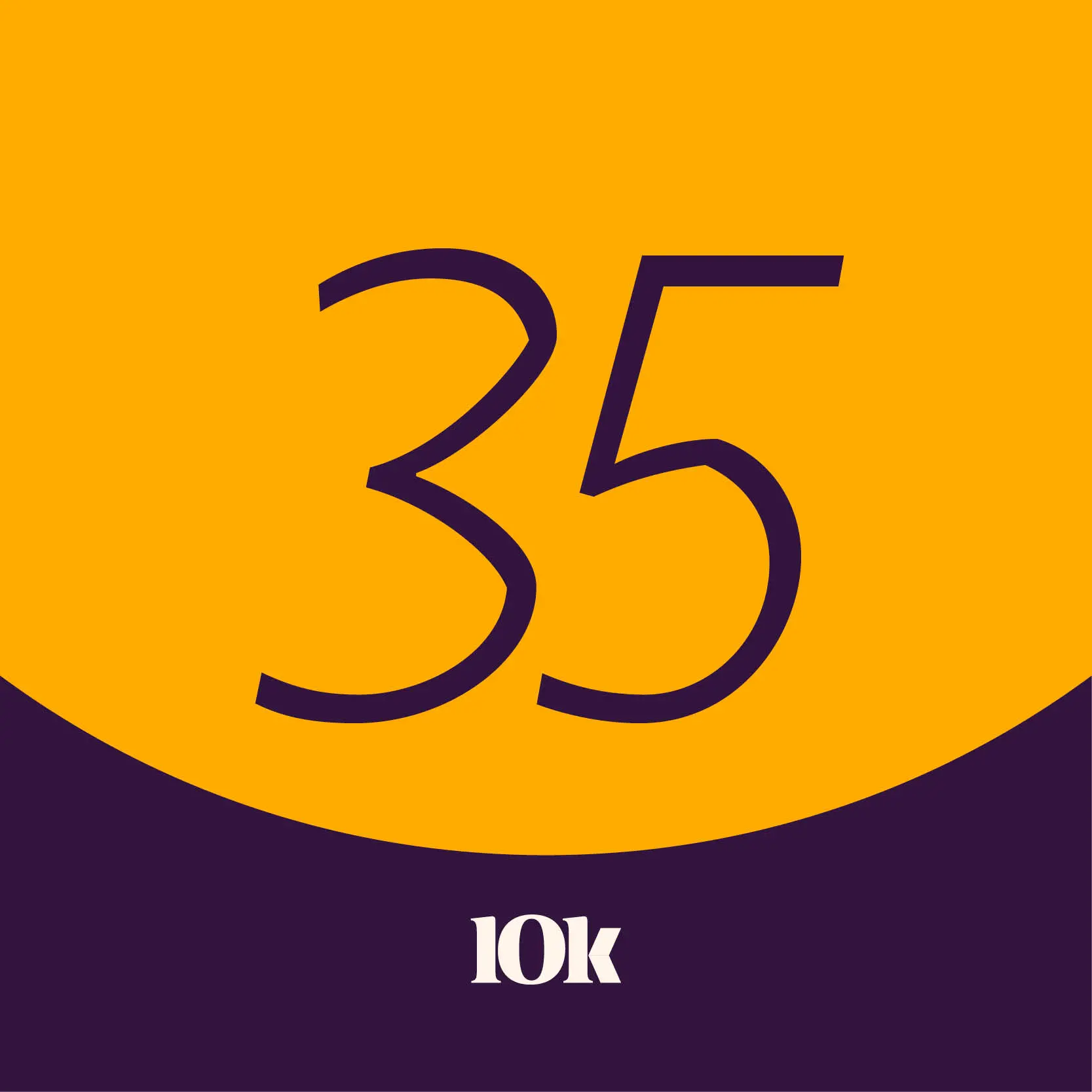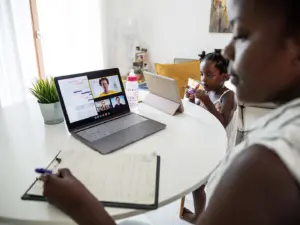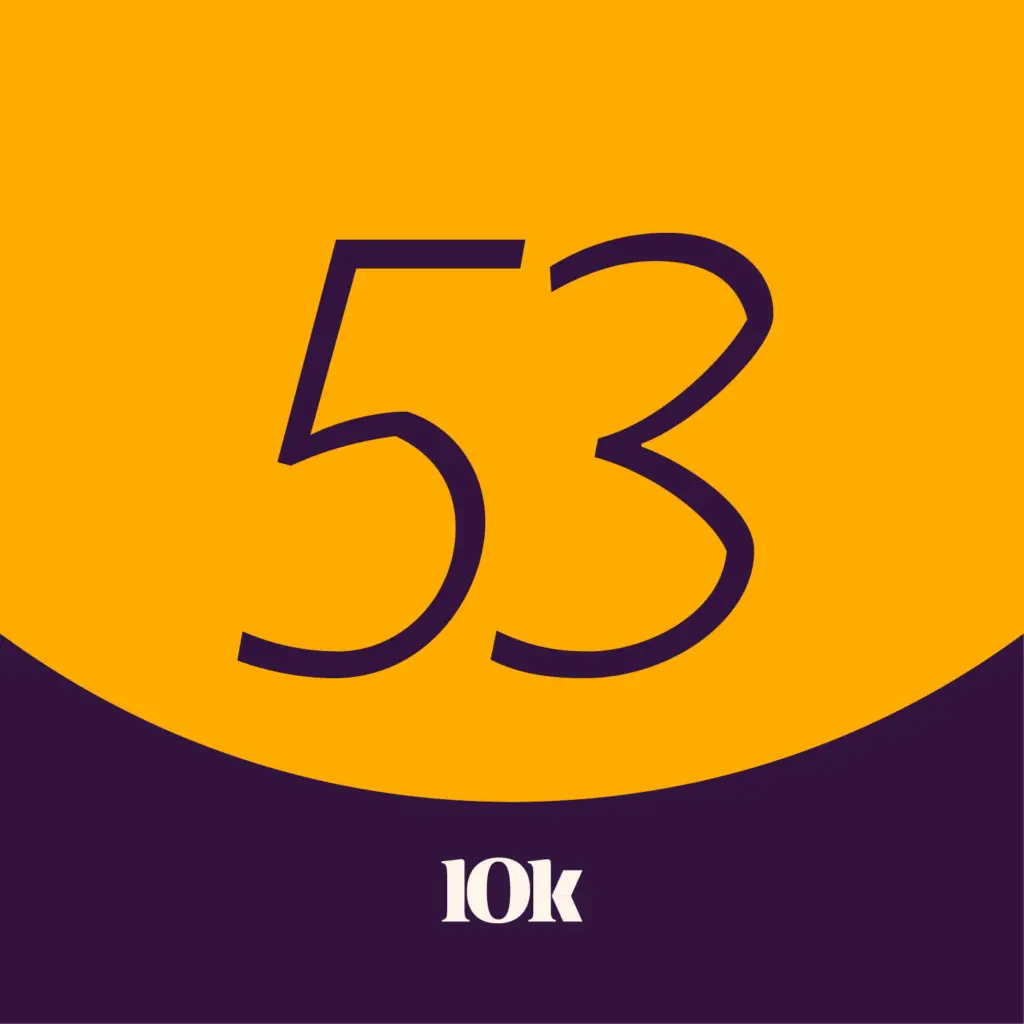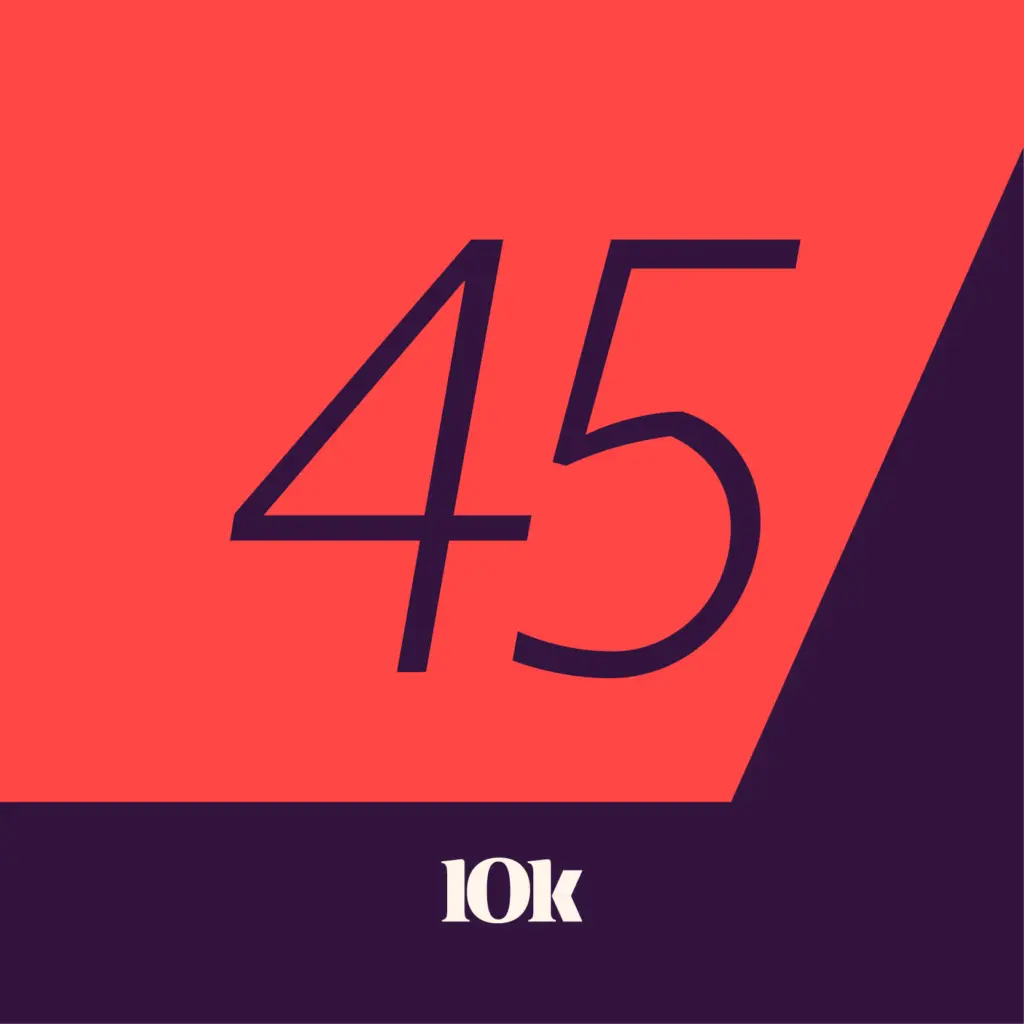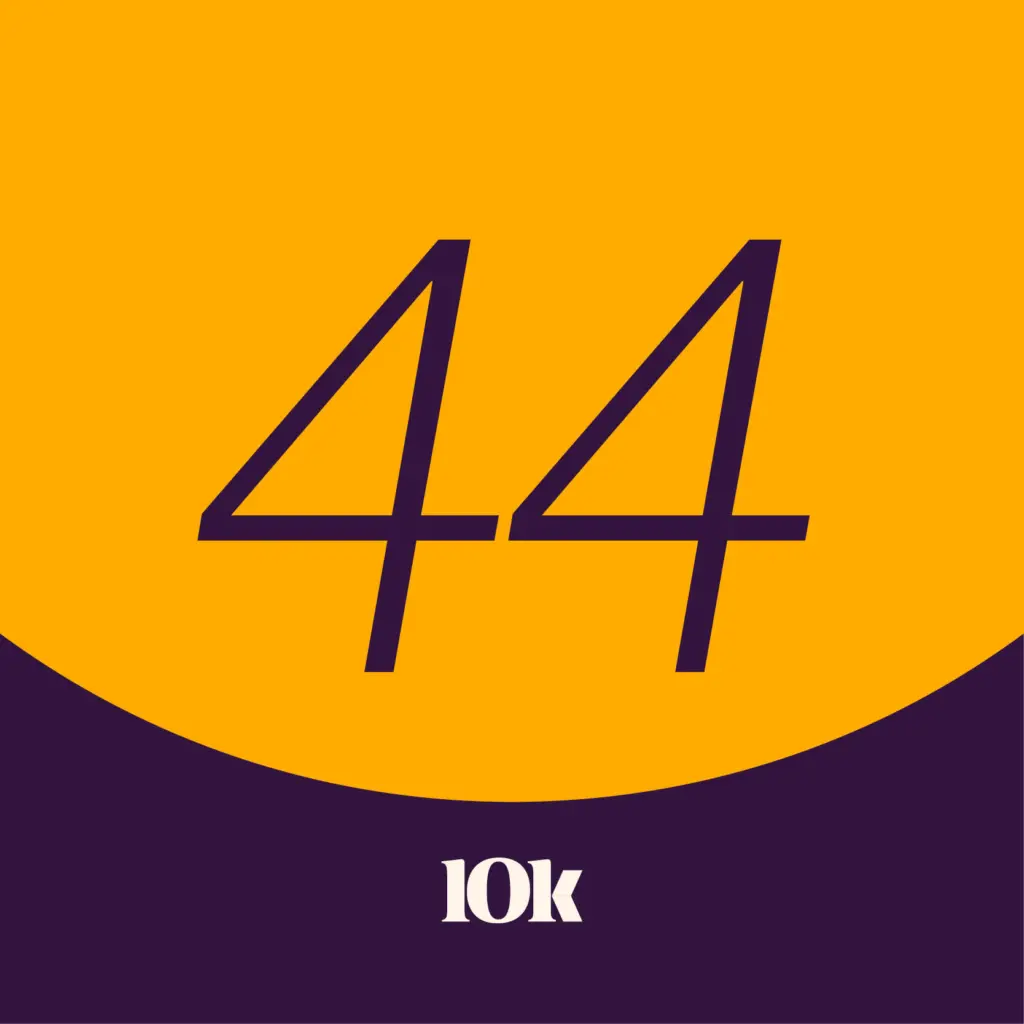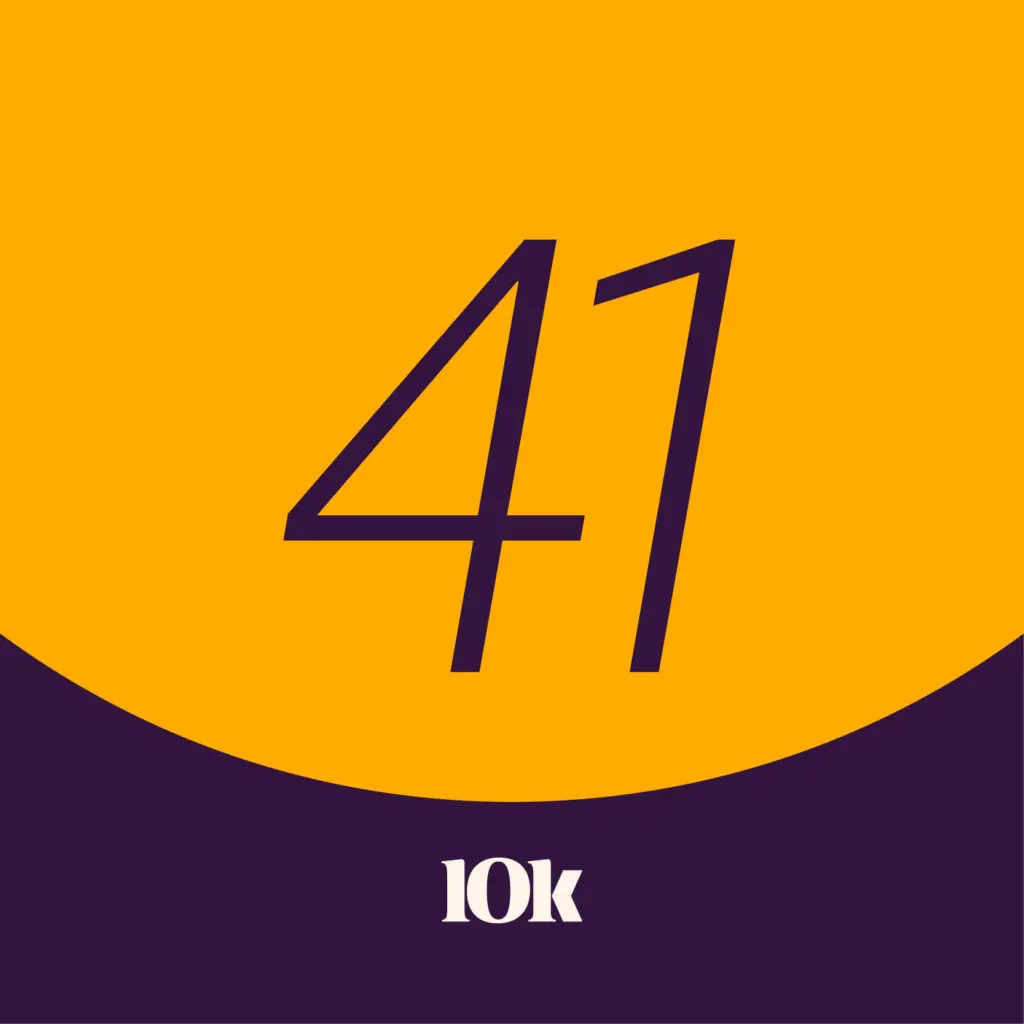Zoom, Slack, Microsoft Teams and a variety of other tools for the remote workforce have allowed us to continue to drive business forward in the Covid-19 era. Video calls, asynchronous messaging, virtual collaboration — all of this has suddenly become the norm rather than the exception for the workplace. With these tools and techniques at our fingertips, we have fostered work relationships and maintained forward momentum amid a constantly changing market.
Unfortunately, team members starting new jobs are facing an uphill battle as they try to forge relationships without all the traditional trappings of onboarding: touring facilities, going out to lunch, bumping elbows, etc. At Vervint, we thrive on kitchen conversations, hallway hellos and fireside discussions. We’re also experiencing rapid growth. So the switch to virtual onboarding for new employees has been a challenging one.
Vervint’s Director of Application Development (and veteran 10k Feet Podcast host), Andrew Powell interviews Tori Dean, a talent experience consultant at Vervint, and Sabrina Brooks, a 2020 remote hire to the Configuration Services Team.
Andrew, Tori and Sabrina discuss remote onboarding from their different perspectives and hypothesize what the future may bring for hiring and remote connection.
Enjoy!
This podcast content was created prior to our rebrand and may contain references to our previous name (OST) and brand elements. Although our brand has changed, the information shared continues to be relevant and valuable.
Episode Transcript
Andrew Powell: Hey, everybody. Since March 13th, Vervint has been working from home and hiring, which means we’ve had to welcome and onboard our newest team members entirely remotely. Tori Dean from our talent experience team and 2020 hire, Sabrina Brooks, join us to talk about joining a new company without coming into the building, and what that’s been like. Well, we don’t know how long this trend will continue, Tori and her team have learned a lot, and they’re excited to share some of their lessons in today’s episode.
View Full Transcript
Onboarding, bringing people into the company. That’s always been a challenging job trying to set people up for success, but man did 2020 make that harder. I’m so so excited to have the two of you with me. Maybe if you could take just a second, introduce yourself, and talk about what you do at OST, Tori and Sabrina, then we’ll get into it.
Tori Dean: Sure. Yeah, I’ll kick it off, and happy to be here, but my name is Tori Dean and I’m a talent experience consultant at OST. And my whole role actually focuses on the onboarding experience, so onboarding for full-time employees, as well as any contractors that OST brings on. And I also say that I take on other special projects with our talent experience team. Some of them that do still relate to onboarding, but some of them relate to other employee experience building, so that’s me.
Andrew Powell: Fantastic. Fantastic. So you spend all day, every day, just worried about those experiences and those touch points for people coming into our organization.
Tori Dean: Yes.
Andrew Powell: That’s super. How about you, Sabrina—
Sabrina Brooks: Yeah.
Andrew Powell: and welcome to the podcast.
Sabrina Brooks: Thank you so much. I’m excited to be here. Thanks for the invite. My name is Sabrina Brooks and I am a Configuration Services Developer in our integration services practice. So opposite of Tori, I don’t do any onboarding or talent scouting, but she did talk to me before I started on my stay, so Tori and I had a relationship before I even started at OST, and my role every day is to work with our clients, and basically I develop 2D and 3D graphics.
Andrew Powell: Very exciting. Sabrina, how long have you been with OST?
Sabrina Brooks: Since April, so just going on eight months.
Andrew Powell: So your entire onboarding experience was remote.
Sabrina Brooks: Yes it was.
Andrew Powell: Have you had a chance now to meet some OSTers face-to-face?
Sabrina Brooks: Absolutely. Our team has monthly meetings and some of those had been held in person, so that’s been really nice to social distance with the team. And we do a lot of Zoom chats, team chats, so we see each other face-to-face quite often during the week.
Andrew Powell: So Sabrina, how long after you started OST before you met someone face-to-face?
Sabrina Brooks: Oh gosh, it was definitely a few months before it was face-to-face. I would say probably three to four months. We did a group activity in August. Our team went kayaking, social distance kayaking, and followed that up by social distance drinks and dinner at Rockford Brewing Company, and I think that was the second time I had seen people face-to-face, so July, I believe, was the first time we got together, and so that was, yeah, a few months after starting.
Andrew Powell: So Tori, that’s a whole new world for you than your experience prior to 2020, right? The idea that someone would get hired entirely remotely would be onboarded entirely remotely, and might spend months working as part of the team before they actually physically are in the same room as somebody.
Tori Dean: Yes. That is very different. In the Grand Rapids office and the Minneapolis office, there are a lot of in-person touch points to the onboarding experience, and both people in those offices were very involved in that first day for an employee, so an employee would come in, meet a lot of people, meet their team in person, and it was really only remote employees of OST who had a bit more of a virtual or remote onboarding experience, so very different.
Andrew Powell: Wow. And so that’s a big pivot for you, because so much of what you just described in those first couple of days was intentionally designed to help people feel what made OST special.
Tori Dean: Yeah, exactly. I mean, our approach to onboarding too was, you know, having people feel like they belonged at OST from their first day, and a lot of that dealt with those little personal touches from meeting someone at a front desk when they walked in the door, getting a tour of the building or the spaces, you know, having a lunch outing with the team where it OST paid for lunch, and all of that had to shift to a more virtual experience this year. Very quickly, too, because I think we had, you know, we went remote on, what, March 13th or so, and within a couple of weeks we were onboarding some of the configuration services team members later that month and into April, so it was a quick turnaround as well.
Andrew Powell: Wow. Wow. So how’d you do it? What sort of things did you accomplish in your approach to remote onboarding to try and capture some of that magic that you were providing in person?
Tori Dean: Yeah. So I guess I’ll take a little bit of a step back just to talk about the touches of the in-person experience, too, and we really have looked at onboarding at OST as a full year experience, so instead of like the first day or first week or first month of an employee’s time at a company, we really look at it as like, what is their first year look like? And what are these different touch points that they should have to feel acclimated, feel like they belong at this company? So, you know, we did have a lot of, I guess, heavier touch points on the first part, so their first day, their first week, really their first month, but there are still usually monthly touchpoints from there, whether it was with their team, their manager, the talent experience team, things like that, so trying to keep that—
Andrew Powell: Yeah. So you had a whole year of touchpoints that you had to examine. How do we do this in a different, unique way.
Tori Dean: Yes. Yes. And still keeping in that mind—that goal in mind of how do we help these employees feel like they belong right away, so, you know, currently, we are onboarding everyone remotely, and I say that because about halfway through the summer, we had an experience where we decided let’s try to onboard someone in person since some COVID cases are going down, and what ended up happening, you know, a few days before this person was supposed to start in-person, a lot more COVID cases were increasing again in the Grand Rapids area, and so we had to adjust that really quickly and decided, okay, we’re just going to have to onboard people remotely for the foreseeable future, if anything just to keep their experience positive, keep it consistent so that they know what to expect, and so that OST knows what to expect, too.
Andrew Powell: Right. Right. So how’s it going, Sabrina, are you feeling connected?
Sabrina Brooks: I do. I feel very connected. I think OST really tried to replicate the in-person experience, especially for a first day in a first week. Like Tori said, there were a lot of touch points and I think they were focused on, I mean, for example, they sent each new employee a Grubhub gift card, so we could still have lunch on OST for our first day, and we did a virtual meeting with our whole team, so in lieu of going out and spending that time together, we at least did it online. I received a welcome kit before my first day, and you know, like I said earlier, I talked to Tori a couple of times leading up to my first day, so I initially felt connected, and each day is a new experience, more virtual meetings, but it’s always great to be face-to-face when it’s possible. I think OST did an awesome job and just touching on the culture, you know, that we’re all about, and I appreciate it.
Andrew Powell: Great. So Tori, talk to me about the challenges you encountered with that, because Sabrina just sort of touched on Zoom meeting fatigue or the sort of idea that pretty much your only vehicle is to try and schedule time to look into a camera and talk to someone. I bet you came up with other things. What other sorts of things are you doing beyond just a Zoom outreach?
Tori Dean: Yeah. So a few things that we added in, we kind of looked at it from how can we be really proactive with their touchpoints, because one of the biggest obstacles or challenges was new people feeling like they struggled building rapport quickly and—
Andrew Powell: Yeah.
Tori Dean: building connections and feeling connected with OST. Despite everything that we did, like, that’s still an obstacle that we’re dealing with with new hires. But we did implement an onboarding buddy program, which was a bit more optional before this whole experience, and ended up turning into a more required part of onboarding. So onboarding buddies, new hires are connected with another member of their team, that’s a bit more of a peer, so that they have someone that they can go to, to ask questions to, you know, learn more about different parts of that team or the company, learn about team processes, so the idea behind it is having someone that they can go to that’s not their manager to answer some questions, and so they have someone that they don’t feel like, “Oh, I’m reaching out to a team member. I don’t know if I’m bugging them or not.” The onboarding buddy is there to be bugged, and so that program was something that we made a bit more standard for us and the onboarding experience, and I think it ended up being really helpful.
You know, it’s been hard to escape the Zoom meetings, so one thing that we did switch up with the onboarding was scheduling meetings for new hires beforehand. So trying to be a bit more proactive with who they’re connecting with and when, so we did kind of schedule those as in conversations in their calendar before they started, so that they knew who they’d be meeting with, that they would be meeting with people, and that they would at least have a few meetings on their calendar where they are hopefully building some connections to the company, and, you know, across the company.
Andrew Powell: Yeah. Yeah. So how are we doing then, Sabrina? I’m going to put the spotlight back on you and ask—
Sabrina Brooks: Yeah.
Andrew Powell: do you have a buddy? How’s the relationship with your buddy? Do you—how are you feeling? How connected are you feeling?
Sabrina Brooks: Yes. So the first day I did meet with my buddy, who was a teammate on configuration services, and basically we installed all of the programs that I needed together, and we just walked through, you know, some of the first day material, and kind of how Tori said, I just bugged them. As soon as I had a question, you know, and it’s my responsibility to do so, you know, working remotely, if I’m stuck on something, no one can see that stuck look on my face, and that’s the only way to progress, so, you know, he knew he was there for that and just really supported me. But in addition to that, for my training or for everyone who onboarded remotely in configuration services, we had several meetings a day that were previously scheduled to us starting, and it was with the mentors on my team, and it was to track our progress, and just make sure that we weren’t stuck, there were no blockers, and a chance for us to ask questions, and just dig a little bit deeper than just kind of, you know, struggling through it independently, so there was always someone within reach. We have Slack channels, we have teams channels. There was really no lack of communication opportunities.
Andrew Powell: Nice.
Sabrina Brooks: So as long as, you know, as a new hire, you were willing to reach out and get the answers, someone was going to give them to you.
Andrew Powell: That’s fair. Sabrina, let me keep the spotlight on you just for a second and ask you this though. Bittersweet in some ways, like, are there aspects of the onboarding process that are just more difficult because of COVID and because it’s all remote [inaudible][00:13:04]?
Sabrina Brooks: I would say yes. I mean, one thing that I personally miss just about going into an office every day, not just saying hello or good morning to my team members, but just anyone. Lisa would be the first person I’d see every day, and just acknowledging human existence, I guess, is something that I kind of miss, because it’s usually a couple hours until I have a meeting and I’ve already been working and not just Slack messaging everyone saying, “Hey, Hey, Hey, good morning.” But, you know, that’s kinda something I miss is just that immediate connection when, you know, I get up and start my day, and it’s always nice to be able to shadow people and do a little bit more, you know, peer programming, but we made it work the way that we had to, and I think everyone was successful, because we all started contributing right away.
Andrew Powell: So Tori said, we’re gonna bring up a really interesting point in my mind. Sabrina works in configuration services, which is one of our areas of professional services consulting, and one of the ways our consultants sort of get integrated into the larger OST is in all of that informal connection that they might have—gathering in the kitchen for lunch or having a happy hour event—that really has changed dynamically beyond just the onboarding process. How much do you think about that and what sort of things are you thinking about that might help to address some of that disconnect?
Tori Dean: Yeah, that’s a great question. You know, I think that—I think it’s something that we haven’t been able to escape the lack of building connections, you know, that struggle, so, you know, we sent out some onboarding surveys to new employees, and they responded with no. I understand that we can’t really change this, but you know, the connection building is still a little tough, and for a while, in my mind, I was like, yeah, that, you know, maybe we can’t change that, but now as time is going on, and as we continue to work remotely, I’m like, okay, how are we going to change that? How are we going to really help people connect with one another virtually? You know, build rapport a bit more quickly. So I don’t have the answers today, but that is something that our Talent Experience team is diving into, because while at first we thought this experience may not last that long, now it is, and we are going to have to answer to those unknowns or those questions. So I’ve been thinking about it from that lens.
Andrew Powell: Yeah.
Tori Dean: Yeah.
Andrew Powell: Yeah. You make a great point, too. I think on that infamous Friday the 13th, Friday, March 13th, when we closed our office, we, and heck everybody in America was thinking, we were looking at a couple of weeks or maybe a month—
Tori Dean: Yeah.
Andrew Powell: and here we are talking in December. I don’t think any of us thought, as we got into this, that we were doing more than a stop gap, and now we’re really actually considering what we’re doing in the context of how we do what we do broadly, not just as a stop gap.
So Tori, that makes me wonder, what’s the future look like? Are there aspects of the lessons you’re learning now that you think you carry forward even in a world beyond COVID lockdown?
Tori Dean: Yes. You know, we’ve—with OST I think we’ve been talking a bit more about a hybrid model for the office, and that hasn’t been 100% decided yet, but it’s been a conversation that it seems like the company has been having, and I’m imagining a hybrid model for onboarding. So when you think about it in the office, it’s like there’ll be a mix of people working in the office, potentially in the future and working from home, coming into the office to collaborate, meet with their teams, getting heads down time from home, so I’m imagining that for onboarding as well. Maybe a person comes in for their first week, then they onboard in the office for a bit, and then they can go back to working from home or, you know, some sort of variation of that. But I’m also having to think about OST scaling as a company, too, and what’s on my mind is making sure that that’s still a consistent experience, because I think—
Andrew Powell: Yeah.
Tori Dean: what we’ve traditionally done is like, “Oh, well, this team likes to work out of the office, so we’ll cater to them. This team primarily works remote, so we’ll cater to them.” I think that will be harder to do, and still create a consistent onboarding experience, so that’s what’s in my mind is, as OST grows and as we’re having to relook at onboarding for new hires, if it is a hybrid model, can we still make it a consistent one, so that everyone’s—
Andrew Powell: Yeah.
Tori Dean: getting very similar experience.
Andrew Powell: For sure. Tori, that makes me think, as OST grows and scales and as you learn in this experience how we onboard people remotely, does that change your thinking about where to find talent and how best to match talent to opportunities? Are there opportunities to be less aggressive regionally and more aggressive in terms of looking at national or international talent, because you have a process now for onboarding, and because you feel like you can give someone an inclusive experience now largely remotely?
Tori Dean: Yes, that’s been a conversation in our talent team, really, since we all started going remotely. Tamara Iakiri, our Director of Talent Experience, had our recruiting team think about, okay, people can go anywhere now, so we may be losing our talent to other areas, other regions, but that means that we can also be recruiting from other regions, too, so I think our recruiters have opened that up—bringing on people, and even, I think we’ve kind of started in the contractor space where a lot more contractors are located nationally instead of just in the Grand Rapids region, and, you know, we’ve been able to find talent a little bit faster than in the past, and, you know, since we have the onboarding experience that’s remote, too, we’re able to get them caught up to speed in the same way that we have done before just remotely.
Andrew Powell: Yeah. Yeah, of course. So much to think about. So much opportunity, too, as you look at sort of the future and how we staff and how we recruit and how we bring people on board.
So Sabrina, when the world settles down a little and the office opens again, are you super anxious to get in the office and start making face-to-face connections or—
Sabrina Brooks: I’m pretty anxious and one awesome thing, right now, I’m living in Muskegon, so I’m a little bit further away from the office, but I just bought a house around the corner from the office, so I’ll be like three miles. So I’ll be [inaudible][00:20:08]—
Andrew Powell: Look at you planning ahead.
Sabrina Brooks: really anxious to get in, you know, it’ll be a lot easier to commute, and I just, yeah, I’m very excited to get to know more people in different practices and areas of the company, and there’s still a lot for me to learn and a lot of people for me to meet, so it’s something to look forward to.
Andrew Powell: Excellent. Excellent. Muskegon or as they say in the movies “Mus-ke-gone.”
Sabrina Brooks: Yes.
Andrew Powell: Yes. Yes. Well, I’m glad you’re coming into the west side and I’m excited for you to be close to the office. Hopefully, we’ll get that office open soon.
Sabrina Brooks: I know, fingers crossed.
Andrew Powell: So Tori, what’s the future look like as you think of the next six months? Continuing to refine your onboarding process, favoring, mostly, remote onboarding as the world starts to settle down. Things are going to stay pretty much the same and we’ll figure out how to reintroduce some aspects of face-to-face. What’s your vision?
Tori Dean: Yeah, I think that we are, well, I’m starting to work on a few different projects that cater a bit more to the virtual experience, so you have actually starred in one of our videos featuring the active team, Andrew. But one project is carrying out those videos a bit more, so that when people onboard, part of that can be watching some videos about different teams at OST to help better explain who OST is, what we do, what different teams make up this company—
Andrew Powell: Yeah.
Tori Dean: and with that, even creating some more high-level videos of the OST’s history, what we do as a company, what our strategies are year to year, so that those can be a bit more built into the onboarding experience, and with the goal of helping people get caught up to speed with who OST is a bit more quickly. So I can see, you know, for better or worse video being a bit more of an onboarding tool for OST—
Andrew Powell: Sure.
Tori Dean: you know, from that standpoint. And I can also see, one thing—once people feel a bit more comfortable being in person still having those in-person connections, whether it’s a team with gathering, maybe we can have teams come into the office for a team lunch on an employee’s first day.
Andrew Powell: Sure.
Tori Dean: But it’s, you know, from the surveys that we’ve gotten back from employees, and I think even some of the conversations that are happening nationally, you know, you can’t beat—to some extent, you can’t beat that in-person connection building, so we’ll try our very best to make it really strong virtually as strong as we can, but as people become more comfortable with getting back in person, I think we’ll definitely still want to have those elements to onboarding.
Andrew Powell: Yeah, that sounds great. I really think what you hit on this the same sort of thing that lots of businesses are grappling with and that is, how do we take some of the best of what we’ve learned this year and apply it to a better future, and that’s really exciting to me. Even using some stock and prerecorded videos to supplement Zoom, it’s a different experience—
Tori Dean: Yes.
Andrew Powell: it’s tailored, it’s edited down, it creates some additional connection that might otherwise be lost when you aren’t wandering around an office, and help to fill in gaps for when you do wander around the office. Really exciting.
Tori Dean: And I do have something else to add to on that where I don’t know if we somehow foresaw the future, but at the beginning of 2020, one of the projects that the talent team and a few others were working on was building out the loop, which is a internal company website for OST employees—
Andrew Powell: Oh, yeah!
Tori Dean: for information sharing, and that ended up coming in handy a lot, I think during, during COVID where we had the space where OST could start sharing information virtually on this platform. I think we were just very lucky that that ended up happening around the same time that all of this happened, but it has also been a tool for onboarding where there’s a whole, kind of, website within the loop that’s geared towards onboarding for new employees, so it has information, and it answers questions and—
Andrew Powell: Yeah!
Tori Dean: even has like a new hire checklist all in there, so just yet another place where people can get information a bit more self-serve, which I think is also going to be a part of the onboarding experience going forward to from a remote standpoint is where can people answer their questions themselves.
Andrew Powell: For sure. For sure. That makes a lot of sense, Tori. Sabrina, have you been to the loop? Is that a place you—
Sabrina Brooks: Absolutely. The checklist is something I recall looking at. It’s been eight months now since I accessed a bunch of the onboarding resources documentation, but I remember looking at it and it was useful when I needed it.
Andrew Powell: Alright. Excellent. Listen, I am so thankful, Tori and Sabrina, that you spent some time chatting with us about the onboarding experience. I know the things that OST is dealing with as we grow in scale in the wake of a pandemic or the same sort of things that our clients and business partners and friends and families are struggling with.
So while you’re trapped at home under pseudo quarantine trying to keep yourselves and your loved ones safe, what games are you playing? Do you have a favorite game you’re turning to to help you through, Sabrina?
Sabrina Brooks: I literally had been playing Yahtzee like crazy.
Andrew Powell: Nothing wrong.
Sabrina Brooks: It’s funny that you asked that.
Andrew Powell: Nothing wrong with a little rolling, right? It’s a fine game.
Sabrina Brooks: Some Yahtzee, been doing some coloring, and just painted some pottery, have to go drop that off to get fired, so then [inaudbible][00:26:17] out all the projects.
Andrew Powell: Wow. You’re super busy.
Tori Dean: That’s awesome.
Andrew Powell: How about you, Tori, you playing any new games? Doing anything fun to keep yourself from going crazy?
Tori Dean: Yeah. Game-wise, so my husband and I, you know, we own our home, but we also have a friend that lives with us, so we have an extra quarantine buddy at home, and we play Settlers of Catan a lot.
Andrew Powell: Sure, sure.
Tori Dean: And when we have a situation where we can bring one more person into our quarantine circle, we’ll play Euchre as well, so those are our games that we play.
Andrew Powell: Ah, yes, the Michigan game, the official game of the state of Michigan.
Sabrina Brooks: I miss Euchre.
Andrew Powell: You can play Euchre online. I mean—
Sabrina Brooks: True, true.
Andrew Powell: maybe not an ideal experience, but honestly, honestly, I’ve played a lot of Euchre online. A lot of Euchre online.
Alright. Well, thank you. Thank you both so much for chatting with us about onboarding and thanks so much for riding with this experience with us, Sabrina, as we figure out how to bring people in and get them integrated into OST. We sure are glad to have you, and I’m glad Tori and her team found a way to help make that experience as OST-ish as we could, while we, of course, help.
Sabrina Brooks: Likewise, I am so happy to be here, and if I was one of the first people to onboard, then I have absolutely complete faith that OST is going to continue doing an amazing job, because they did an awesome job for me.
Andrew Powell: And that’s definitely thanks to Tori and her team. Thanks so much.
Tori Dean: Yeah. Thank you, and it was fun to talk about today, too, because it definitely had its challenges, but it was a, I would say, it was a fun challenge overall to have to do, so—
Andrew Powell: Those are the best challenges when we can—
Tori Dean: Yeah.
Andrew Powell: have fun and also get things done.
Tori Dean: Yup.
Lizzie Williams: OST, changing how the world connects together.
